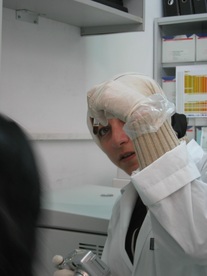Capacity building
IsDB, Gates Foundation support new program for young Arab women
scientists in the Middle East and North Africa
|
ICBA Press release- Dubai, UAE, August 29, 2016
The International Center for Biosaline Agriculture (ICBA) launched today the design phase of a new major regional program to empower young Arab women scientists and leaders in agricultural research and development. Funded by the Islamic Development Bank (IsDB) and the Bill & Melinda Gates Foundation, the design phase will lay the groundwork for the Young Arab Women Scientists Leadership (Tamkeen) Program, the first of its kind in the Middle East and North Africa (MENA) region. The Program will help to build and improve skills and capacities of a new generation of young Arab women scientists and leaders, contributing to the UN Sustainable Development Goal on gender equality and women’s empowerment. Dr. Ismahane Elouafi, Director General of ICBA, said: “Women are keepers and developers. They do deserve and require more opportunities. That is why in this Program we wanted to give priority to equipping women, namely women scientists, with necessary knowledge, skills and tools so that they can realize their full potential and contribute more to their countries’ economies.” The past few decades have seen a considerable increase in the number of women scientists and leaders working in agricultural research in both industrialized and developing countries. However, empirical evidence shows that there is a disproportionately low number of women working in senior scientific and managerial positions, especially in the MENA region. Women scientists face a wide range of barriers ranging from family and social expectations to limited networking opportunities to lack of targeted leadership programs. These challenges limit women’s opportunities for advancement into senior positions. “IsDB pays significant attention to the role of women in development. Therefore, improving the skills of Arab women scientists in agricultural research is a step in the right direction. We believe that empowering women with the right skills in agricultural research will contribute to alleviating poverty and making food available to the poor. We will work with our partners to ensure that skill acquisition in our member countries is barrier free,” stated Dr. Osman El-Feil, Director, Agriculture and Rural Development Department, IsDB. Agricultural research, development and extension agencies will benefit from the increased presence of women in senior research and leadership positions as increasing diversity of leadership voices is shown to improve outcomes. Women leaders in science are better placed to identify challenges and solutions for women in agriculture, resulting in improved food security and nutrition for all rural people. Therefore, it is important to promote more balanced representation of women in decision-making processes related to agricultural knowledge, science, and technology at all levels. Mr. Hassan Al-Damluji, Head of Middle East Relations at the Bill & Melinda Gates Foundation, said: “At the Bill & Melinda Gates Foundation, we are incredibly optimistic about the role science can play in driving change for the world’s poorest people. We are also determined to ensure that women are front and center in all aspects of development work, and that includes women scientists creating new solutions to food security challenges. That is why we are so excited about our partnership with ICBA and the Program that this grant will help to design.” The design phase will serve to identify the barriers and challenges facing young Arab women scientists working in agricultural research and development, as well as knowledge and skills they need to advance their careers. ICBA will assess leadership and innovation modules of agricultural science programs, as well as the needs of women scientists in the MENA region, focusing on nine Arab countries (Algeria, Bahrain, Egypt, Jordan, Lebanon, Morocco, Palestine, Tunisia, and the United Arab Emirates). The findings will inform the Program that will help to improve leadership opportunities for women scientists in agricultural research institutions throughout the MENA region and increase knowledge exchange and active peer/mentor networks for Arab women scientists. The Program will also help to identify and empower groups of women champions and build a critical mass of pathfinders, visionary leaders, and change agents, ultimately contributing to better and more women-centered solutions for improved food security and nutrition in the MENA region. |
2016
|
|
Article Rights
|
